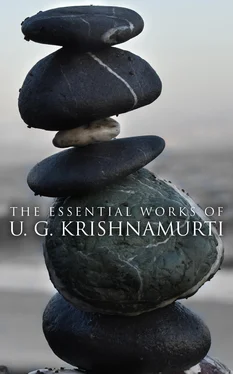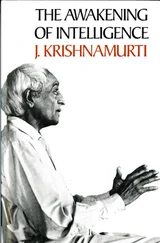U. Krishnamurti - The Essential Works of U. G. Krishnamurti
Здесь есть возможность читать онлайн «U. Krishnamurti - The Essential Works of U. G. Krishnamurti» — ознакомительный отрывок электронной книги совершенно бесплатно, а после прочтения отрывка купить полную версию. В некоторых случаях можно слушать аудио, скачать через торрент в формате fb2 и присутствует краткое содержание. Жанр: unrecognised, на английском языке. Описание произведения, (предисловие) а так же отзывы посетителей доступны на портале библиотеки ЛибКат.
- Название:The Essential Works of U. G. Krishnamurti
- Автор:
- Жанр:
- Год:неизвестен
- ISBN:нет данных
- Рейтинг книги:5 / 5. Голосов: 1
-
Избранное:Добавить в избранное
- Отзывы:
-
Ваша оценка:
- 100
- 1
- 2
- 3
- 4
- 5
The Essential Works of U. G. Krishnamurti: краткое содержание, описание и аннотация
Предлагаем к чтению аннотацию, описание, краткое содержание или предисловие (зависит от того, что написал сам автор книги «The Essential Works of U. G. Krishnamurti»). Если вы не нашли необходимую информацию о книге — напишите в комментариях, мы постараемся отыскать её.
Content:
The Mystique of Enlightenment
Courage to Stand Alone
Mind is a Myth
No Way Out
Thought is Your Enemy
The Natural State
The Essential Works of U. G. Krishnamurti — читать онлайн ознакомительный отрывок
Ниже представлен текст книги, разбитый по страницам. Система сохранения места последней прочитанной страницы, позволяет с удобством читать онлайн бесплатно книгу «The Essential Works of U. G. Krishnamurti», без необходимости каждый раз заново искать на чём Вы остановились. Поставьте закладку, и сможете в любой момент перейти на страницу, на которой закончили чтение.
Интервал:
Закладка:
_______
Q: This giving-taking business, I don't understand.
UG:I can't say anything about what he meant when he said "I can give it, but can you take it?" but in a way that helped me to formulate my own question. You see, if somebody were to ask me a similar question now, I would say there isn't anything to get from anybody. Who am I to give it to you? You have what I have. We are all at 25 Sannidhi Street, and you are asking me "Where is 25 Sannidhi Street?" I say you are there. Not that I know I am there. This wanting to know where you are — you are asking that question.
_______
(UG says he never again visited Ramana or any of "those religious people," and never again touched any religious book except to study for his philosophy examinations.)
Then my real search began. All my religious background was there in me. Then I started exploring. For some years I studied psychology and also philosophy (Eastern and Western), mysticism, all the modern sciences — everything, the whole area of human knowledge, I started exploring on my own. The search went on and on and on, and "What is that state?" was my question, and the question had an intensity of its own. So, "All this knowledge doesn't satisfy me. Why read all this?" Psychology was one of my subjects for a Master's degree — unfortunately, at that time it was part of our syllabus. I was interested in psychology for the simple reason that the mind had always intrigued me: "Where is this mind? I want to know something about it. Here, inside of me, I don't see any mind, but all these books talk of mind. Come on, let me see what the Western psychologists have to say about the mind." One day I asked my professor "We are talking about the mind all the time. Do you know for yourself what the mind is? We are studying so many books — Freud, Jung, Adler and the whole gang. All that stuff I know — I read the definitions and descriptions that are there in the books — but do you yourself know anything about the mind?" He said "Don't ask such inconvenient questions. (Laughter) They are very dangerous questions. If you want to pass the examination, just take down these notes, memorize them, and repeat them in the answer papers — you will get your degree." "I am not interested in a degree; I am interested in finding out about the mind."
(His grandfather died, and UG left the University of Madras without completing his degree. In 1943 he married.)
Then I got involved with the Theosophical Society, because of my background. I inherited the Theosophical Society, J. Krishnamurti and a lot of money from my grandfather. So that made it easy for me: plenty of money was there at that time — fifty or sixty thousand dollars — so I could do all this kind of thing. I got involved with the Theosophical Society as a lecturer (and eventually UG was elected Joint General Secretary of the Society in India), but my heart was not in it — "All this is second-hand information. What is the point of giving lectures?" I was a very good speaker at that time, but not now any more. I was a first-class speaker, lecturing everywhere, on every platform. I addressed every university in India. "This is not something real to me. Anybody who has brains can gather this information and then throw it out. What am I doing? Why am I wasting my time? This is not my living, not my means of livelihood. If it is your living, all right, then I can understand, you repeat like a parrot and make a living; but this is not my living. And yet, I am interested in something, I am interested in that kind of a thing."
Then (in the late 1940's, towards the end of UG's time with the Theosophical Society) J. Krishnamurti arrived on the scene. He had just returned from the United States and started his new kind of....
Q: Are your related to Krishnamurti?
UG 'Krishnamurti' is only a given name, not a family name. His family name is Jiddu — 'Krishnamurti' is quite a common name — Jiddu Krishnamurti.
I got involved with him. I listened to him for some seven years, every time he came. I never met him personally, because the whole 'World Teacher' business and all that created some kind of a distance. "How can a World Teacher be created? World Teachers are born, not made" — that was my kind of make-up. I knew the whole background, the whole business. I was not part of the inner circle; I was always on the periphery, I never wanted to involve myself. There was the same hypocrisy there too, in the sense that there was nothing in their lives; they were shallow — the scholars, master-minds and remarkable people. "What is this? What is there behind?"
Then Krishnamurti came along and, after seven years, circumstances brought us together. I met him every day — we discussed the whole thing. I was not interested in his abstractions at all. His teaching did not interest me at all. I told him once "You have picked up the psychological jargon of the day, and you are trying to express something through this jargon. You adopt analysis and arrive at the point that analysis is not it. This kind of analysis is only paralyzing people; it is not helping people. It is paralyzing me." My question was the same question: " What is it that you have? The abstractions that you are throwing at me, I am not interested in. Is there anything behind the abstractions? What is that? Somehow I have a feeling — I can't say why — that what is behind the abstractions you are throwing out is what I am interested in. For some reason I have a feeling — it may be my own projection — you (to give a familiar, traditional simile) may not have tasted the sugar, but at least you seem to have looked at the sugar. The way you are describing things gives me the feeling that you have at least seen the sugar, but I am not certain that you have tasted the sugar."
So, we struggled for years and years. (Laughs) There were some personal differences between us. I wanted some straight, honest answers from him, which he did not give, for his own reasons. He was very defensive — he was defending something. "What is there for you to defend? Hang your past, the whole thing on a tree and leave it to the people. Why do you want to defend yourself?" I wanted some straight, honest answers about his background, which he didn't give me in a satisfactory way. And then, towards the end, I insisted, "Come on, is there anything behind the abstractions which you are throwing at me?" And that chappie said "You have no way of knowing it for yourself." Finish — that was the end of our relationship, you see — "If I have no way of knowing it, you have no way of communicating it. What the hell are we doing? I've wasted seven years. Goodbye, I don't want to see you again." Then I walked out.
(It was probably about this time that UG was puzzled by the appearance of certain psychic powers.)
Before my forty-ninth year I had so many powers, so many experiences, but I didn't pay any attention to them. The moment I saw a man, I could see the entire past, present and future of that man without his telling me anything. I didn't use them; I was wondering, puzzled, you see — "Why do I have this power?" Sometimes I said things, and they always happened. I couldn't figure out the mechanism of that — I tried to — "How is it possible for me to say something like that?" They always happened. I didn't play with it. Then it had certain unpleasant consequences and created suffering for some people.
_______
(UG was travelling all over the world, still lecturing. In 1955 he and his wife and four children moved to the United States in search of treatment for his eldest son's polio. By 1961 his money was finished, and he felt beginning within him a tremendous upheaval which he could not and did not wish to control, and which was to last six years and end with the 'calamity' (as he calls his entry into the natural state). His marriage broke up. He put his family on a plane to India, and he went to London. He arrived penniless and began roaming the city. For three years he lived idly in the streets. His friends saw him as heading on a headlong course downhill, but he says that at the time his life seemed perfectly natural to him. Later, religious-minded people were to use the mystics' phrase 'the dark night of the soul' to describe those years, but in his view there was "no heroic struggle with temptation and worldliness, no soul-wrestling with urges, no poetic climaxes, but just a simple withering away of the will.")
Читать дальшеИнтервал:
Закладка:
Похожие книги на «The Essential Works of U. G. Krishnamurti»
Представляем Вашему вниманию похожие книги на «The Essential Works of U. G. Krishnamurti» списком для выбора. Мы отобрали схожую по названию и смыслу литературу в надежде предоставить читателям больше вариантов отыскать новые, интересные, ещё непрочитанные произведения.
Обсуждение, отзывы о книге «The Essential Works of U. G. Krishnamurti» и просто собственные мнения читателей. Оставьте ваши комментарии, напишите, что Вы думаете о произведении, его смысле или главных героях. Укажите что конкретно понравилось, а что нет, и почему Вы так считаете.












